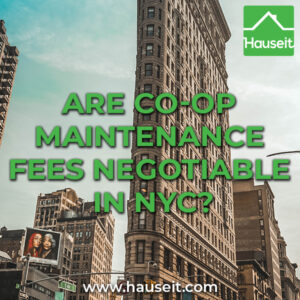Co-op monthly maintenance fees in NYC are not negotiable. The amount of monthly maintenance (and the rate and frequency of any increases) is set by each co-op’s Board of Managers and ultimately driven by a building’s cost of operations.
The specific monthly maintenance paid by an individual unit owner is determined by the number of shares assigned to a particular apartment relative to the total share count in the building.
Co-op shares in a building are assigned to each unit based on a number of factors including square footage and which floor the apartment is on.
For example, a top floor apartment may be allocated 300 shares compared to only 75 shares for a smaller unit on the second floor. Both monthly maintenance and special assessments are allocated proportionally across individual co-op units in a building based on the number of shares owned.
Co-op maintenance fees for similar apartments in different buildings can vary widely. This is because each co-op building has its own unique finances, streams of income and associated operating costs. A co-op building’s cost of operations includes: real estate taxes, building repairs and maintenance, staff salaries, utilities, insurance, management fees as well as any debt servicing or land lease payments.
In the case of land lease co-op buildings, it’s not uncommon to see monthly maintenance figures which are three or more times higher than for a comparable apartment in the neighborhood.
That being said, co-op apartments with higher monthly maintenance typically trade at a discount compared to apartments with more reasonable maintenance figures.
A lower purchase price and correspondingly smaller mortgage payment may offset some or all of a higher maintenance figure. A savvy purchaser may utilize a discounted cash flow analysis to compare a less expensive co-op with higher monthly maintenance to a pricier apartment with lower maintenance.
While co-op maintenance fees and assessments are not negotiable from the perspective of a unit owner, it may be possible as a buyer to negotiate with a seller and ask them to cover some or all of any ongoing or upcoming assessment.
If you’re thinking of buying a co-op but you’re concerned about high maintenance, just remember one thing: monthly maintenance only goes in one direction:UP. All else equal, you should expect to be paying less money for an apartment with higher maintenance.
Before submitting an offer on a co-op with a high monthly maintenance figure, we suggest reviewing the building financials and requesting a 5 year maintenance history from the listing agent.




